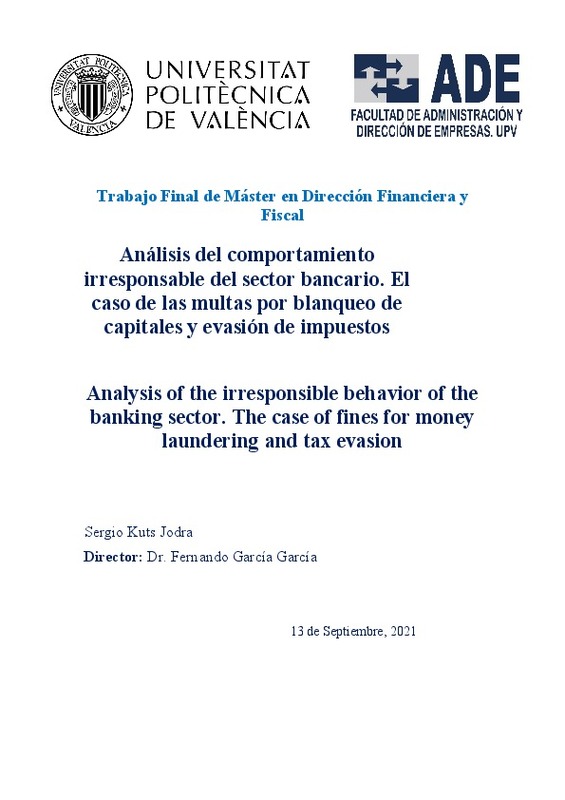JavaScript is disabled for your browser. Some features of this site may not work without it.
Buscar en RiuNet
Listar
Mi cuenta
Estadísticas
Ayuda RiuNet
Admin. UPV
Análisis del comportamiento irresponsable del sector bancario. El caso de las multas por blanqueo de capitales y evasión de impuestos
Mostrar el registro sencillo del ítem
Ficheros en el ítem
| dc.contributor.advisor | García García, Fernando
|
es_ES |
| dc.contributor.author | Kuts Jodra, Sergio
|
es_ES |
| dc.date.accessioned | 2021-10-14T15:09:03Z | |
| dc.date.available | 2021-10-14T15:09:03Z | |
| dc.date.created | 2021-09-29 | |
| dc.date.issued | 2021-10-14 | es_ES |
| dc.identifier.uri | http://hdl.handle.net/10251/174743 | |
| dc.description.abstract | [ES] El presente Trabajo Fin de Máster, consiste en una investigación del sistema bancario internacional que actúa en apoyo de las prácticas delincuentes de sus clientes: blanqueo de capitales y evasión de impuestos. La primera parte del trabajo plantea una serie de cuestiones que ayudarán a abarcar todo el camino que sigue el fraude y los ciclos del lavado de capitales. Además, se abordan cuestiones como los entramados financieros internacionales o el papel desempañado por los empleados de la banca en todo el proceso. La segunda parte del trabajo consiste en analizar las normativas aplicadas a las entidades financieras y sus actuaciones en el momento de mantener en secreto la información sobre infracciones. Se comprueba que, a pesar de todas las sanciones impuestas contra las delincuencias financieras tanto a nivel nacional como internacional, los bancos son los primeros implicados en el crimen. La tercera parte del trabajo presenta un estudio de la evolución del sistema bancario internacional desde 2008-2020, centrándose en el análisis de los 15 bancos más importantes de Europa y Estados Unidos. Se pretende estudiar la naturaleza de la actividad delictiva bancaria y sus consecuencias penales y administrativas. | es_ES |
| dc.description.abstract | [EN] This paper is based on an investigation into causes of how the banking system functions in solidarity with the criminal activities of its clients: money laundering. The first part of this assignment proposes a series of questions that will aid in the understanding of the steps that cause fraud. The objective is to comprehend the article by means of asking multiple questions. Are the banks involving their employees in money laundering, or the problem is originated from the monster known as the financial institutions that had spread across the globe? Delving into the issues, one discovers that money laundering is indeed composed by three layers. The second part of the assignment consists of discussing the regulations that are applied to financial entities and also the manners by which these entities attempt to omit their illicit behavior (which could be penalized). It has been shown that banks are found to be at the epicenter of such crimes, originating a snowballing effect on these problems, despite all the sanctions regarding financial delinquency (both on the national as well as the international level). Accordingly, it will be possible to verify the evolution of the banking system in the time span of twelve years, between 2008-2020, as well as twenty of the most important banks (EU and the United States) are going to be discussed in this paper. Consequently, the banks are going to be divided into two bands: those that have already been on trial and have not been fined, and those that have already been penalized for smaller quantities compared to the transaction amounts carried out with their clients. The irresponsible behavior of each of the twenty banks will be analyzed particularly, regarding their illicit practices along the way, such as market manipulation and Panama papers, which they accomplish on the daily basis, reaching the objectives of their clients. | es_ES |
| dc.format.extent | 89 | es_ES |
| dc.language | Español | es_ES |
| dc.publisher | Universitat Politècnica de València | es_ES |
| dc.rights | Reserva de todos los derechos | es_ES |
| dc.subject | Regularización bancaria | es_ES |
| dc.subject | Código de buenas prácticas | es_ES |
| dc.subject | Responsabilidad social corporativa (RSC) | es_ES |
| dc.subject | Sector bancario | es_ES |
| dc.subject | Banca | es_ES |
| dc.subject | Sanctions and penalties | es_ES |
| dc.subject | Evasión de impuestos | es_ES |
| dc.subject | Lavado de capitales | es_ES |
| dc.subject | Sistema bancario | es_ES |
| dc.subject | Sanciones y penalizaciones | es_ES |
| dc.subject | Tax evasion | es_ES |
| dc.subject | Money Laundering | es_ES |
| dc.subject | Banking System | es_ES |
| dc.subject.classification | ECONOMIA FINANCIERA Y CONTABILIDAD | es_ES |
| dc.subject.other | Máster Universitario en Dirección Financiera y Fiscal-Màster Universitari en Direcció Financera i Fiscal | es_ES |
| dc.title | Análisis del comportamiento irresponsable del sector bancario. El caso de las multas por blanqueo de capitales y evasión de impuestos | es_ES |
| dc.title.alternative | Analysis of the irresponsible behavior of the banking sector. The case of fines for money laundering and tax evasion | es_ES |
| dc.type | Tesis de máster | es_ES |
| dc.rights.accessRights | Abierto | es_ES |
| dc.contributor.affiliation | Universitat Politècnica de València. Facultad de Administración y Dirección de Empresas - Facultat d'Administració i Direcció d'Empreses | es_ES |
| dc.contributor.affiliation | Universitat Politècnica de València. Centro de Investigación de Ingeniería Económica - Centre d'Investigació d'Enginyeria Econòmica | es_ES |
| dc.contributor.affiliation | Universitat Politècnica de València. Departamento de Economía y Ciencias Sociales - Departament d'Economia i Ciències Socials | es_ES |
| dc.description.bibliographicCitation | Kuts Jodra, S. (2021). Análisis del comportamiento irresponsable del sector bancario. El caso de las multas por blanqueo de capitales y evasión de impuestos. Universitat Politècnica de València. http://hdl.handle.net/10251/174743 | es_ES |
| dc.description.accrualMethod | TFGM | es_ES |
| dc.relation.pasarela | TFGM\145231 | es_ES |
Este ítem aparece en la(s) siguiente(s) colección(ones)
-
ADE - Trabajos académicos [3699]
Facultad de Administración y Dirección de Empresas






